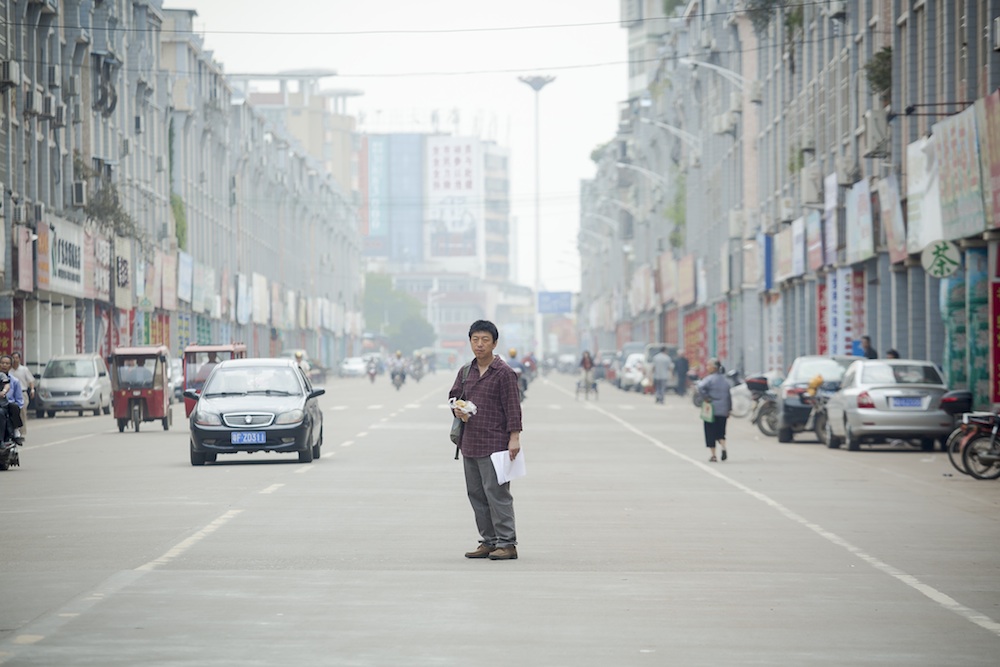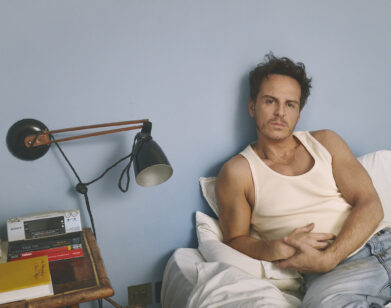Peter Chan’s Last Hope
In Dearest, the latest film from Chinese writer-director Peter Ho-Sun Chan, a divorced couple suffers through the abduction of their only child. Shenzen residents Tian Wen-Jun and Lu Xiao-Juan sacrifice everything to search for their three-year-old son, Peng: Tian loses his business and apartment; Lu her second husband. Together, they find some solace in a support group for parents of missing children. At Lu’s first meeting, her ex-husband recalls those who tried to take advantage of his grief by offering him false tips concerning the whereabouts of his son. “As more time passed, the phone stopped ringing,” he tells the group. “I began to think being conned wasn’t so bad. When people tried to con me, at least they offered me hope. Hope is like food—without it you die.”
Three devastating years later, Tian and Lu are reunited with Peng. They are the only parents within the support group to find their child. It’s not, however, the happy ending you’d expect. Now six years old, Peng has been happily living on a farm in rural Southern China with a younger sister and foster mother. He does not recognize his biological parents.
Dearest debuted at the Venice Film Festival before going on to screen at TIFF. It is inspired a documentary Chan happened upon on television in China. “It’s not fictionalized,” Chan says of the film. “It’s written by God.”
EMMA BROWN: What do you hope people take away from the film?
PETER CHAN: I’m not that socially conscious. I’m not expecting this to be a movie about social problems, even though it is about social problems. I’m not trying to change the world or change the law or anything like that. But to me, other than the fact that this is a very touching and emotional human story, the other aspect that really got me excited and made me want to make it is the duality of things in life—sometimes what you see as right is not exactly what you think. The first half of the film is about the protagonists, who are the victims—the biological parents with their son abducted. In the middle of the movie they find their son, and that’s the beginning of the second movie. You think the antagonist is the captor’s family, but the captor’s family—this loving mother—is ignorant of the crime. This loving mother is a suitable, if not better, mother for the son. And the son is happy in that family. You see the perspective of who you believed [was] the antagonist. I think that duality is what attracted me to the story. If anything, I would want the audience to take away from the film in that respect, more than just the social aspect of the film.
BROWN: Have you thought about what you would have done were you in the same position as the biological parents?
CHAN: Of course you want your son back. There was a very interesting question [at the TIFF press conference]. I did not expect it. I was never asked it before and I don’t know whether I’ll be asked of in the future. [The question] was should the son decide? I don’t think that the law in any country would ask a six-year-old to decide his fate. But getting the son back is a very selfish act. Because to the son, he is very happy, he’s very close to the foster mother. And I remember the real father telling me in my research interview with him, “I felt like I was kidnapping my son for the second time when I got him home.” That was very heartbreaking to me.
BROWN: There’s a particularly affecting moment towards the end of the film, when the foster mother tells the biological father not to give his son peaches because he is allergic.
CHAN: We thought there should be an interaction between the foster mother and the biological father. That was not in the original script. It’s just to show that this is going to stay forever. It’s not going to change. No matter how much you stop her from seeing your son, she will stay in your life and your son’s life forever. In the beginning, when the father was doing the video on the Internet trying to tell people, “If any of you bought my son, don’t give him peaches,” you think that this is the most personal thing that you know about your son that nobody else knows. But now the foster mother is telling you the same thing as if you’re not the father and she’s really the mother. Your son is never just yours anymore; she will be his mother forever. You can’t change that fact.
BROWN: I wasn’t familiar with any of the actors, though I know they’re really famous in China.
CHAN: They’re huge actors. [When] I used to work in Hong Kong, most of the movie stars are not trained actors. They’re not the greatest actors. In China, because they’re all trained actors with formal education in drama, you end up having a lot of big movie stars who are also very accomplished actors. I think I was very lucky to get six of the biggest stars who also happen to be the best actors in China.
BROWN: Did you always plan on casting such famous actors in the film?
CHAN: I wanted to cast them, but I wasn’t sure if I could get them. For the biological father, Huang Bo is the top box office comedian in China. He has never done a dramatic role before. When he was making the movie, he was very worried that people would laugh. Zhao Wei, the actress [who plays] the foster mother, is like Julia Roberts in China. She’s [been] the biggest, biggest star in China for the two decades. She hasn’t been in a film for three years because she directed a movie, and the movie she directed was also one of the top five grossing films of all time in China. This is her first film back as an actress. I think I got her at the right time because after being a director I think it gives more layers to her performance.
BROWN: Being unfamiliar with the actors is almost an advantage. When the foster mother was first introduced, I didn’t know how significant her role would be. For audiences in China, once they see her it must be obvious that she is going to have a big role.
CHAN: I know. Which is a good thing, because then you just follow the movie. I think a lot of [Chinese] fans are pretty edgy in their seats after an hour of not seeing the star of the movie. A lot of the people would come to the theater because of her, and after sitting for 55 minutes and she’s still not in the movie…
BROWN: Are you emotional when you watch movies? Do you cry ever?
CHAN: I don’t cry in life; I cry when I watch other people’s movies and I cry when I make movies and I cry when I watch my own movies too. When you write a story that is so emotional, I think it’s inevitable. I can’t help myself.
BROWN: The two child actors—the boy who played Peng and the little girl who played his sister—did a great job. Was it difficult to find them?
CHAN: Yeah, I was really lucky. I’m not good at working with child actors. As director, after you make a choice with actors there’s nothing much that you can do. You can only inspire them, discuss the characters with them. That’s my way of dealing with my actors. But when you’re dealing with kids, you can’t discuss the characters with kids. So I’m always very helpless when I’m dealing with child actors. Based on my past experience, you can’t just choose one child for each character—they would end up in front of the camera and suddenly have stage fright, and we have to stop production. I’ve stopped production two times before because of child actors. We couldn’t afford that, so we chose three candidates for each character. We trained them for six months before I started production, and finally ended up with two choices for each and took them on set. On the first day we picked one and if it didn’t work, we switched to the other one. They are all just kids from the village in Southern China where the film is set and they have never acted before. It’s not exactly like they know how to act—you have to know how to edit. You have to learn how to lure them to do things that might mean something completely different from the context of what you’re trying to shoot. The first day was certainly not easy for both kids. I remember texting my wife and saying, “I’m going to have a heart attack because I don’t know how to get a performance out of them. And then it got better and better and better.” When we couldn’t deal with them, the only one that could tell them what to do was their mother. The mothers were very helpful. They should have been credited A.D.s too. They were the ones that got the performance out of the kids.
DEAREST WILL NEXT SCREEN AT THE LONDON FILM FESTIVAL IN OCTOBER.







